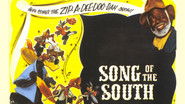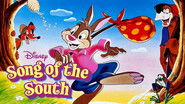Bluebell Alcock
Ok... Let's be honest. It cannot be the best movie but is quite enjoyable. The movie has the potential to develop a great plot for future movies
Murphy Howard
I enjoyed watching this film and would recommend other to give it a try , (as I am) but this movie, although enjoyable to watch due to the better than average acting fails to add anything new to its storyline that is all too familiar to these types of movies.
Adeel Hail
Unshakable, witty and deeply felt, the film will be paying emotional dividends for a long, long time.
Bob
This is one of the best movies I’ve seen in a very long time. You have to go and see this on the big screen.
mark.waltz
Only one thing in this film disturbs me: the implications of violence towards Brer Rabbit from Brer Bear and Brer Fox. First, they want to cook him alive, then Brer Bear with his big club wants to bash his head in. They stupidly forget their initial intentions of eating him by tossing him into a briar patch to supposedly bleed to death from the sharp thickets. I did not recall this from my only viewing of this back in an early 1970's rerelease but I think that part as an 8 year old would have disturbed me. I however was extremely touched by the affectionate friendship between young Bobby Driscoll and the sweet character of Uncle Remus played with great heart by James Remus. Obviously a former slave, Uncle Remus was either too tired to fight his battles, more concerned with helping young Driscoll learn about humanity by teaching him about dealing with real life rather than the racial tensions and hatred between adult whites towards blacks, now free if not completely liberated.I recall as a youngster having my own Uncle Remus with my preschool teacher, an elderly black woman, whom my parents would hire as a baby sitter. Like Uncle Remus, she told my siblings and I stories, played games with us, and embedded herself into my memory with her loving nature and humanity, subtly teaching us about the evils of racism without preaching or lecturing. She reminded me of a combination of Louise Beavers and Hattie McDaniel with her gregarious nature, and seeing the gentle but no nonsense performance of McDaniel here, confirmed my memory. Unlike her mammy in "Gone With the Wind", her character here isn't overly cynical, quite gentle and closer to Louise Beavers' character in the Bobby Breen folklore "Way Down South". While the bear and fox are the official villains, it's Driscoll's mother (Ruth Warrick) who is the human antagonist, ordering Bassett to stop telling Driscoll the same stories he had told her as a child. Warrick against the will of her own mother (Lucille Watson), as gentle a plantation owner that you can imagine, and a character greatly white washed, especially when she sweetly tells Bassett that she could never be mad at him. Warrick quickly realizes her mistake, setting up an emotional vigil when Driscoll is injured. The look on the face of Driscoll's young black friend Toby during this ordeal expresses the innocence of children who sometimes have more wisdom and sense than adults.Certainly, this film has its questionable moments, but there are so many timeless values to learn from this. Audiences today are smart enough to realize that life in the post-civil war South was not all singing and fun for the former slaves who were trying to make their own lives after decades of slavery. If you are not touched by the special relationship between Driscoll and Bassett, then try to open your heart to the final reprise of the Oscar-winning Zip-a-Dee-Doo-Dah when everything comes together and truly is satisfactual.
Breggen
Disney has chosen not to release this film for good reason. For the most part the animated sections are very endearing and free of racism but the rest of the film is certainly not. I can't believe how people can't see that this is racist. Probably because they are at least somewhat racists themselves even if they don't realize it.The film portrays slavery in an almost positive light, which is an obvious rewriting of history and an injustice. It also depicts black people as mostly unintelligent lick-spittles who desire nothing more than to serve their masters well and who are endearingly stupid and jolly. Black slaves sometimes acted like that as a disguise to help protect them from their enslavers' hatred and wrath, not because they actually were like that. It was an act they put on out of necessity for survival. The film also perpetuates the racist archetype of the "magical n*gger or negro". If you don't know what that is or why it is a bad thing to perpetuate you should google it.I somehow managed to see this film as a child when I was very young, I think in Disney World itself, and I honestly feel that it gave me a biased view of black people for the first few years of my life. It is a film that can very powerfully affect children. I would have thought that most adults could watch it and see it for its shortcomings without being negatively influenced by it in their attitudes but after reading some of the above comments I am not too sure about that anymore.Not showing this film to young children under the trusted auspices of the Disney brand, which is exactly what would happen if it was released, is an act of decency, not an act of political correctness run amok as many of the apparently ignorant and racist people reviewing this film would have you believe.There is no doubt that this is NOT a film that should be viewed by young children as entertainment and that is probably why Disney doesn't release it except for academic study by adults...thank God.
Smoreni Zmaj
One of my favorite childhood memories and one of Disney's masterpieces, far better than anything they are making today. Unfortunately, it is hard to find because Disney was forced to withdraw it... Why ?! Because movie is accused for racism and bad stereotypes. Movie was not directly forbidden, but whatever agency was in charge for this kind of stuff those days, they let Disney know that showing warm family atmosphere between slaves and their owners is unacceptable and can not be tolerated. I understand fights against discrimination and for equality and tolerance, but they really push it too far and destroy many beautiful things of great value by sticking to their principals. I mean... Disney did not come up with this story in 20th century with intention to offend black race. This movie is based on book that is written in year 1800. Should they raise author from the dead to change his novel, just because society circumstances are changed 150 years after ?! If this movie is offensive to black population because of slavery, then lets banish slaves from movies about ancient Greece or Rome, lets change the history. Ridiculous. This movie is not offensive discrimination, this movie is one of most emotional and beautiful masterpieces made for kids in history of animation.
kgprophet
I believe it has been about 30 years since I've seen this film. One may think this banned Disney feature with only some portions of it animated would have a cult status. The ban is by Disney itself, and it is not a cult film because on it's own it is just another nice children's film. Watching for the first time as a grown adult, I could identify the signature weepy music and somewhat adult undertones. The animation was fine, the rabbit reminded me of the rabbit in Winnie the Pooh.The happy tone is what you expect for a children's film, offset by upsets, such as a Mother denying a child's wish to have a puppy. But the absence of this film in recent memory left a hole in my childhood recollections. Having been able to view a great transfer recently, I could appreciate the innovative mix of live action and animation (for only half of the running time). The effect looked very clean for the time period, and this digital copy made all the live characters very vivid.The character Uncle Remus won the actor an Academy Award, portraying a gentle and caring man, who becomes a surrogate father while the boy is staying at a southern plantation. That warm feeling is part of what the Disney 'magic' was all about back then. Ultimately, this film is geared for too young of an audience to be as solid of a classic as their many more popular films. But it has a right to be a part of our memories, and banning the film dishonors the performances and the art of this classic.







